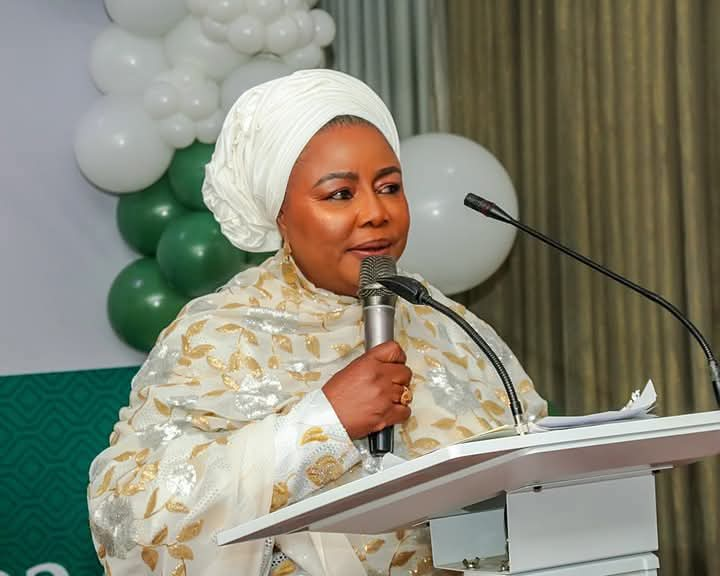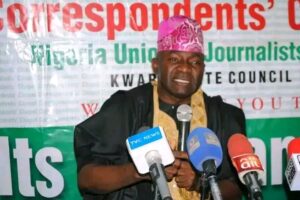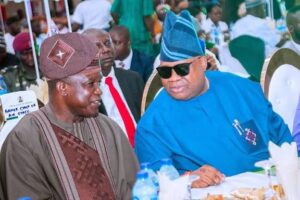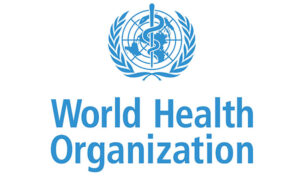
By Abdulfatai Tomori
As the calendar turns and a new year dawns, we find ourselves in a season of reflection, a time when societies around the globe celebrate individuals whose contributions have transcended their fields, leaving indelible marks on the fabric of history. This period of recognition has become an annual practice among organizations, media outlets, and communities worldwide, all taking a moment to acknowledge those who have changed the course of history through their actions, vision, and leadership.
Among the most prominent of these annual recognitions is the title “Man of the Year,” bestowed by Time Magazine to individuals whose influence, actions, and achievements have shaped society. This tradition, which traces its roots to 1927 when Time Magazine first introduced the concept of the “Man of the Year,” has since evolved to celebrate a diverse range of honourees. American pilot Charles Lindbergh received the first title in 1928 in honour of his historic transatlantic flight, which enthralled the globe and signalled the start of a new age in aviation. As the years progressed, this honour expanded its scope, eventually encompassing individuals of different genders, backgrounds, and professions, reflecting the diverse spectrum of global leadership.
Today, the “Man of the Year” recognition includes activists, innovators, cultural icons, and policymakers, each representing the societal shifts, struggles, and triumphs of their time. These individuals are celebrated not only for their personal achievements but for their ability to inspire, challenge, and transform the world around them. Through their actions, they offer a glimpse into the values that define a particular moment in history, compelling us to reflect on the future we wish to create. This celebration of remarkable figures encourages us to ponder the legacies we hope to leave behind and the directions we wish to pursue in the coming year.
In 1999, Time Magazine rebranded the title to “Person of the Year,” making it more inclusive of both genders and a broader range of accomplishments. Before this change, several notable women had been named “Woman of the Year,” including figures such as Wallis Simpson (1936), Queen Elizabeth II (1952), and Corazon Aquino (1986). This evolution in the title reflects a broader societal shift, one in which the contributions of women were increasingly recognized and celebrated, signalling a transformation in the understanding of leadership itself.
As we stand at the threshold of 2025, the discourse surrounding “Person of the Year” continues to evolve. This year, Time has named the US President-Elect, Donald Trump, while Nigeria’s ThisDay Newspaper has selected President Bola Ahmed Tinubu for the honour. In addition, various organizations are turning their attention to women, celebrating the powerful contributions they have made to their communities and the global stage. Time Magazine, for example, has nominated twelve influential women for recognition this year, including world-renowned environmental activist Greta Thunberg.
The acknowledgement of women as “Person of the Year” or “Woman of the Year” goes beyond a mere accolade—it serves as a profound celebration of their resilience, transformative leadership, and unwavering commitment to shaping a better world. As the world grapples with significant challenges, honouring women who stand at the forefront of change is especially vital. These women have not only impacted their respective fields but have also exemplified the values of courage, vision, and compassion, thereby creating legacies that will inspire generations to come.
In Nigeria, transformative leadership is exemplified by many, particularly among women, but one individual stands out as my personal “Woman of the Year.” Although I have never had the privilege of meeting her in person, the remarkable narratives of her accomplishments have profoundly inspired me. This distinguished individual is Hajia (Dr) Muheebat Dankaka, NPOM, OON. When history pens the chronicles of women whose leadership has redefined governance and institutional integrity in Nigeria, Dr. Muheebat Dankaka will undoubtedly occupy a prominent chapter. Her journey from a modest upbringing to the helm of a constitutionally significant institution is a compelling narrative of resilience, excellence, and visionary leadership.
Dr. Dankaka’s venture into public service is as noteworthy as her accomplishments in business. President Muhammadu Buhari appointed her as the FCC Chairman in 2020, making her likely the first woman to hold this position. The Federal Character principle, enshrined in Nigeria’s 1979 Constitution, was established to foster balanced representation for the nation’s diverse ethnic and regional groups. Despite these noble intentions, the Commission, created in 1995 to oversee the implementation of this principle, has grappled with challenges such as inefficiency, corruption, and nepotism. The initial aim of the FCC was to ensure that federal appointments, public offices, and national resources were distributed equitably among Nigeria’s varied populations. However, the Commission has faced significant obstacles that have undermined its credibility and effectiveness over the years.
This is where Dankaka’s leadership has proven transformative.
Since its establishment, the Federal Character Commission has had three substantive chairpersons: Alhaji Adamu Fika, Alhaji Bello Kofabai, and Professor Shuaibu Oba Abdul Raheem. In addition to these chairpersons, six acting chairpersons have also played significant roles in the Commission’s efforts. They are Alhaji Muhammadu Ari-Gwaska, Alhaji Ibrahim Funtua, Alhaji Muhammad Bello Alkali, Dr. Shettima Bukar Abba, Mr. Abayomi Sheba, and Ambassador Shinkafi.
Despite multiple attempts to improve its functioning, the FCC remained a deeply inefficient and underperforming body for many years. Initially established to address the country’s vast ethnic and regional disparities by ensuring equitable representation, the Commission struggled to fulfill its mission due to endemic corruption, mismanagement, and a failure to adhere to its founding principles. Rather than promoting unity, the FCC often exacerbated divisions, reinforcing inequality through biased appointments and administrative inefficiency.
However, this entrenched narrative of dysfunction was drastically altered with the appointment of Muheebat Dankaka as the Chairperson. Her leadership would mark the beginning of a profound transformation at the FCC, injecting the institution with renewed purpose and bringing about a shift toward transparency, accountability, and merit-based governance.
Under Dankaka’s leadership, the FCC was restructured to align more closely with its original mandate: the unification of Nigeria’s diverse population through fair representation. The reforms she instituted were not simply operational but also philosophical, reorienting the Commission to embrace a more holistic and inclusive vision of national cohesion. One of the most significant aspects of her tenure was her focus on applying the Federal Character principle in a manner that fostered integration rather than division. The principle, originally designed to prevent dominance by any one ethnic or regional group in Nigeria’s federal institutions, had often been misused, becoming a source of political patronage and inefficiency. Dankaka reimagined its implementation, ensuring that it would serve as a force for unity, rather than division. This shift has had a profound impact, not just on the FCC itself, but on the broader political landscape of Nigeria, where ethnic tensions and competition for resources have long been sources of instability.
Dankaka’s leadership did more than just reform the FCC; it also represented a critical moment in Nigeria’s evolving political culture.
Historically, Nigeria, like many African nations, has been marked by a lack of female representation in high-level political and public offices. Women have often been sidelined in the political sphere, with leadership roles being predominantly occupied by men. Dankaka’s rise to the position of FCC Chairperson thus became a powerful statement about the changing dynamics of leadership in Nigeria.
Her appointment was not only a victory for gender equality but also a challenge to the gender biases that have long pervaded the nation’s governance. By stepping into such a significant role, Dankaka demonstrated that effective leadership is not constrained by gender or ethnicity; it is rooted in competence, integrity, and commitment to the public good. Her leadership serves as an inspiration to women and girls throughout Nigeria and across the African continent, showing them that they too can occupy positions of power and influence.
Dankaka’s leadership took place against the backdrop of Nigeria’s complex social and political landscape, one defined by a multiplicity of ethnic and regional identities. With over 250 ethnic groups, Nigeria has always faced the challenge of balancing unity and diversity. The Federal Character principle was introduced as a means of addressing this challenge, ensuring that no single group would dominate the country’s political structures.
However, due to poor implementation and corruption, the principle often failed to achieve its intended goals. Dankaka’s reforms sought to rectify these issues by emphasizing meritocracy and fairness in the distribution of public office and resources. By making appointments based on merit rather than political patronage, she sought to ensure that every Nigerian, regardless of their ethnic or regional background, would have equal access to opportunities in governance.
These reforms were not just a departure from the status quo but were aligned with the broader political vision of President Bola Ahmed Tinubu’s administration. Tinubu’s administration has emphasized a “Renewed Hope” for Nigeria, one based on inclusivity, fairness, and national unity. Dankaka’s work at the FCC complements this vision, ensuring that the Commission serves as a vital instrument in advancing national integration.
Her efforts have made the FCC a beacon of empowerment, challenging historical patterns of exclusion and marginalization. Through her leadership, the FCC has become a symbol of good governance, demonstrating how institutions can be reformed to better serve the public and promote social cohesion.
On the global stage, Dankaka’s leadership resonates with the calls for inclusive governance and gender equality that have become central to discussions of good governance worldwide. Like internationally celebrated leaders such as Indira Gandhi, Margaret Thatcher, Jacinda Ardern, and Ellen Johnson Sirleaf. These women have guided their nations through significant challenges, showcasing resilience, strategic acumen, and an unwavering commitment to their people. Dankaka’s role in Nigeria mirrors this ability to navigate adversity while championing unity, fairness, and inclusivity in governance.
Like Gandhi and Thatcher, who redefined the political landscapes of India and the United Kingdom, and Ardern, who exemplifies compassionate leadership in New Zealand, Dankaka is transforming Nigeria’s approach to governance. Sirleaf’s role in leading Liberia through post-conflict recovery further underscores the profound impact of female leaders in tumultuous times. Dankaka’s focus on equity and inclusivity is reshaping national policy in Nigeria, not merely through administrative reforms but by inspiring future leaders to prioritize fairness, justice, and the collective good. Her leadership sets a standard that transcends policy, fostering a vision of governance rooted in ethical principles and societal well-being.
Dankaka’s leadership has already begun to make a tangible difference in addressing Nigeria’s regional disparities, an issue that has long been a source of tension and division. Through her focus on fairness and equity, she is creating a governance model where every Nigerian, regardless of their ethnic or regional background, feels valued and represented. Her work at the FCC has started to bridge the gap between Nigeria’s diverse groups, ensuring that national resources, educational opportunities, and public offices are distributed in a manner that reflects the country’s demographic makeup. In this way, Dankaka is not only addressing immediate concerns of fairness and representation but is also laying the groundwork for long-term national stability and growth.
In addition to her reformist agenda, Dankaka is also known for her personal warmth, humility, and accessibility. Her leadership style is characterized by an openness and approachability that contrasts sharply with the often aloof and unresponsive attitudes of many public officials. As a leader, she is not detached from the people she serves; rather, she maintains a close connection to them. In her hometown of Offa, for example, her house has become a bustling hub, attracting a regular stream of people whenever she visits. Many people can attest to her accommodating character, which makes her home a friendly environment for everyone. A story that encapsulates her essence involves a friend of mine. On one occasion, he visited her house to see one of her aides. As he approached, Alhaja Dankaka was on her way out. Despite her tight schedule, she noticed him and others approaching and immediately asked if they were there to see her. When it was discovered that others, besides my friend, had come to see her, she kindly invited them to get closer, putting their wants ahead of her own.
Although my friend did not have a direct interaction with her, what he observed left him profoundly impressed. Moreover, he hadn’t come specifically to see her, yet the encounter revealed a leader who genuinely cares—a rarity in today’s public sphere. It made him reflect on how few leaders would display such humility and sense of belonging. Similarly, a brother from Kaduna shared a similar experience, noting her kindness and hospitality even before she rose to national prominence as FCC Chairman.
Her commitment to assisting those in genuine need, within the limits of her capacity, is widely acknowledged. Alhaja Dankaka is known for never turning away anyone seeking help, making her home a sanctuary for many. Her readiness to support others, irrespective of their circumstances, underscores her reputation as a compassionate and empathetic leader. Yet, it is important to note that, like every mortal, Alhaja Dankaka is not perfect.
Dankaka’s leadership has had a profound influence not just on Nigeria, but also on the global stage. She has become a symbol of what is possible when leadership is grounded in the principles of fairness, inclusivity, and the common good. Her example has shown that effective governance must prioritize the needs of all citizens, not just the privileged few. Her tenure has highlighted the critical role of women in leadership and the importance of diversity and inclusivity in governance. Dankaka’s leadership calls on leaders worldwide to embrace these principles and work toward creating a more just and equitable society.
Looking forward, Dankaka’s vision for Nigeria is one where every citizen—regardless of ethnicity, region, or gender—has an equal opportunity to contribute to the country’s development. By ensuring equitable access to resources, education, and public office, she is helping to reduce the deep-seated divides that have long plagued Nigeria. Her legacy is one of transformation—rooted in justice, inclusivity, and a deep commitment to the common good.
Her leadership is shaping a Nigeria where fairness, opportunity, and social harmony prevail, and her example will inspire future generations of leaders across the globe.
Dankaka’s reforms have already set in motion a wave of change that promises to reverberate across Nigeria for years to come. By prioritizing transparency, fairness, and merit-based governance, she is reshaping the country’s political landscape, making it more inclusive, united, and forward-thinking. Her leadership is a testament to the transformative power of inclusive governance and demonstrates that when leaders prioritize the common good over sectional interests, real, lasting change becomes possible.
Ultimately, Dankaka’s leadership is not just about the policies she implements—it is about the hope and promise she inspires for the future of Nigeria and the world. Her legacy will serve as a powerful reminder that leadership, when rooted in fairness and inclusivity, has the power to transform nations and create societies where every individual has a voice and the opportunity to thrive.
For her tireless dedication to fairness, equity, and transparency, and for her transformative role in reshaping Nigeria’s approach to governance, Hajia (Dr) Muheebat Dankaka, OON, is truly deserving of the title “Woman of the Year.” Her leadership serves as an example of how inclusive, merit-based governance can guide a nation toward progress, unity, and greater social harmony. Dankaka’s legacy will continue to inspire generations of leaders and change-makers, not only in Nigeria but across the globe.
Abdulfatai is a freelance researcher, writer, biographer, and history enthusiast.








